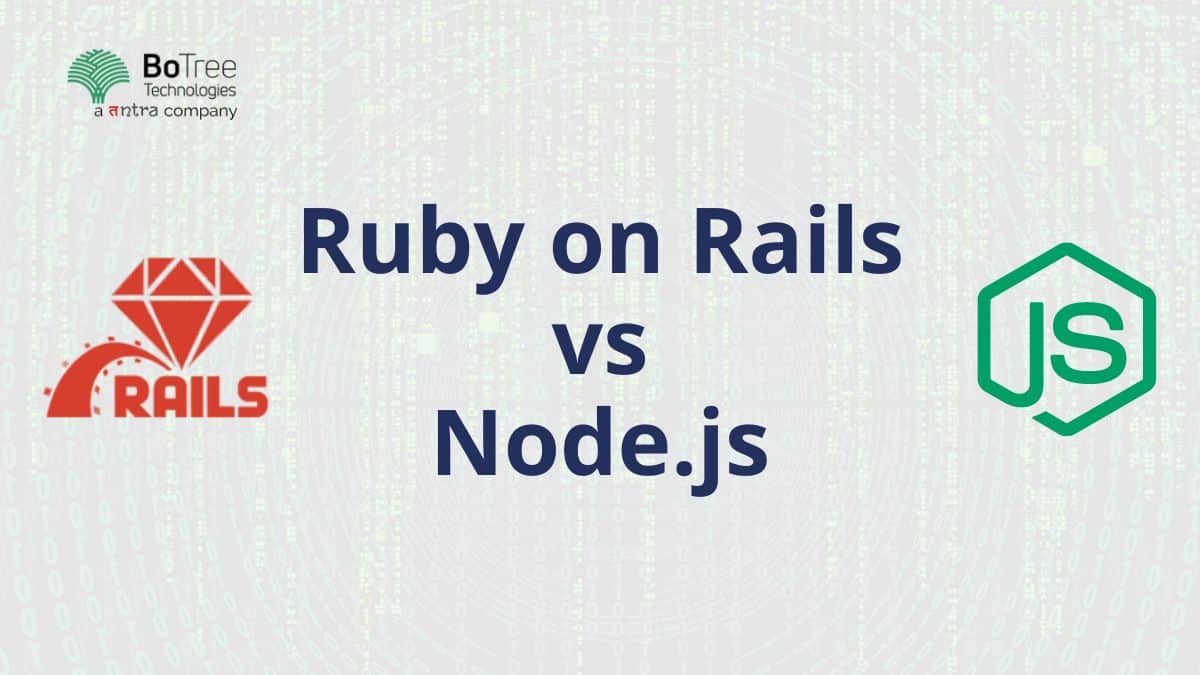
Ruby on Rails vs Node.js: A Detailed Comparison
Prior to stepping into another project, the product development team goes through a serious conversation to pick the best language, framework, or approach for their task. Various technologies have their upsides and downsides. Comparatively, the technology which is looking promising for one company may be a miss for others. That is the reason evaluating the most popular web development technologies is essential for development.
In any case, amidst this confusion, the top most well known languages and frameworks, Ruby on Rails and Node js will quite often have a tremendous discussion with respect to which is better for businesses. The comparison of RoR vs Node js is one to know before making the decision between the two.
At the point when developers are settling on a front-end technology for an app, picking the tech stack is surprisingly easy — CSS, HTML5, and JavaScript are the conspicuous decisions. Backend technology, then again, is much more adaptable. Of late, Node.js and Ruby on Rails are turning into the main backend technologies at any enterprise software solutions company.
This article will show the differences between Node.js and Ruby on Rails. It will enable developers to make the right decision as to which technology to use for development.
Node.js: An overview
Node.js is a server-side, Javascript-based runtime environment that is an enormous open-source tool. It credits its prosperity as an elite execution, versatile framework to the single-threaded process utilized for web loads and async programming. Likewise, a full stack developer can utilize Nodejs-based frameworks like Express, Socket.io, and Meteor.js inside it to improve the backend capacity of a project. Ruby on Rails vs Node.js comparison shows that designed with real-time and push-based architectures, Node JS is known to create single-page applications, sites, and backend API services.
Who Uses Node.js?
Node.js vs Ruby on Rails comparison brings major companies in the picture that use both technologies. Some of the famous companies that utilization Node.js are:
- Netflix: Netflix started using Node.js to empower high-volume web streaming to more than 182 million users, likewise they expected to extend their utilization of Node.js to incorporate content production.
- Uber: In light of its asynchronous primitives and basic, single-threaded processing, Uber’s core trip execution motor was initially evolved in Node.js.
- PayPal: While replacing Java, PayPal decided to utilize JavaScript from the program the entire way to the backend server for web applications.
- NASA: After an unsavory event in space, NASA chose to utilize Node.js to more readily get their information and even forestall death toll.
- LinkedIn: Because of its versatility and performance productivity, Linkedin picked Node.js and quit utilizing Ruby on Rails.
When to Utilize Node.js
Node.js is a command-line environment that allows running a similar JS code that developers are writing for the front-end. It allows sharing code to the backend and program and taking care of different tasks all at once.
- Server-side Development:
Node is great at laying out reliable communication between the server and the program. It utilizes a long-polling method that enables applications to at the same time deal with different incoming requests. Compare Ruby on Rails and Node.js and see that it doesn’t wait for all inquiries to be handled to begin taking care of new requests.
- API Development:
Node.js is a go-to language for REST API development. Representational State Transfer — this is a big motivator for REST. It’s a system that enables clients to rapidly get results to their web demands. Comparison of Ruby on Rails vs Node.js shows that the fundamental standards of REST development are to be uniform, stateless, client-server, have a layered framework, offering a cacheable design, and responding on-request.
- Microservices:
Node.js’ design fits impeccably with the creation of microservices. Its non-hindering request handling calculations and event-driven approach allows developers to associate different services and cycle many interior solicitations simultaneously. Microservices need to communicate constantly, which is the reason ensuring quick data handling is profoundly significant.
Ruby on Rails: An overview
Ruby on Rails is seen as a web development framework. Rails is intended to assist with internal logic, schedule, data management, and so on. Rails/RoR is the most ideal choice for amateurs as it promptly creates and executes incredible and working full-stack sites and web applications. Best of all, Ruby on Rails (RoR) is prominently known for its super-level speed and code proficiency. In straightforward terms, what Java does in many lines, Ruby does it within 5-10 lines.
Who uses Ruby on Rails?
Some of the well known companies that use Ruby on Rails are:
- Airbnb: Airbnb has utilized Ruby on Rails since its initiation. The framework assumes an essential part in Airbnb’s tech stack.
- GitNode: GitNode’s backend is Ruby on Rails, with over 200 million code vaults and 32 million month to month clients. It’s been a long time since the application was laid out by the company’s founders.
- Shopify: Shopify is an incredible illustration of a modern yet very much organized and easy to use Ruby on Rails internet business stage, with more than 820,000 merchants utilizing their service.
- Fiverr: Indeed, Fiverr likewise took on Ruby on Rails at launch, and it is still the technology that powers their online service marketplace.
When to use Ruby on Rails
Ruby on Rails is useful as a backend framework for web applications. It’s known for efficiency and versatility. A full stack developer can create rich usefulness with many less lines of code rather than what they’d require in Java or Node.js.
- Full-stack Web Application:
Ruby on Rails is a profoundly organized framework for web development. Rails has a great deal of rules on how the code must be coordinated. The framework utilizes the Model, View, Controller(MVC) framework. To get an application to answer a request, developers really should characterize a view, controller, and route. Beginning with a MVC framework is tedious, yet eventually, the code is efficient and simple to read. - Content Management Systems:
Ruby on Rails isn’t the all inclusive top decision for content management system development. PHP is as yet the go-to decision. However, Ruby on Rails entered the field as of late and it offers a ton of upper hands. Ruby on Rails enables rapidly writing rich functionalities because of high abstraction levels. Developers can design whole tables and information bases as isolated objects. They can call a major piece of feature with a few lines of code. - Prototyping:
Ruby on Rails allows writing code quickly and carrying out work in features, accessible in the environment. At the point when developers are dealing with the insignificantly reasonable variant of a product, developers don’t require extreme speed and point of interaction but must focus on Node.js vs Ruby performance — the primary need is functional proficiency and efficient development processes. Ruby on Rails offers multiple command-line code code builders, allowing engineers to try not to create code without any preparation. Combined with open-source libraries, this ready-to-use code can accommodate the greater part of functionality.
Read more: Differences between JavaScript & NodeJS for Web App Development
Conclusion
All in all, it isn’t so easy to pick a tech stack for a project. Companies need to consider looking into their plan of action and examining the upsides and downsides of the two technologies. That implies pursuing a choice is by preference.
Both Node JS and Ruby on Rails can assist with accomplishing similar outcomes. However, Rails is wonderful when enterprises need to move at a high speed. While building an application, the language or framework doesn’t exactly make any difference. However, the performance is significant. Dissect the upsides and downsides and afterward get everything rolling.
BoTree Technologies is a top software development company that offers Ruby on Rails or Node.js development services to enterprises and startups.
Contact us today for a FREE CONSULTATION.




